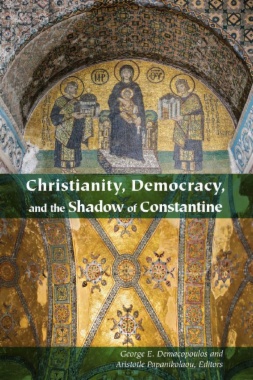Winner of the 2017 Alpha Sigma Nu Award
The collapse of communism in eastern Europe has forced traditionally Eastern Orthodox countries to consider the relationship between Christianity and liberal democracy. Contributors examine the influence of Constantinianism in both the post-communist Orthodox world and in Western political theology. Constructive theological essays feature Catholic and Protestant theologians reflecting on the relationship between Christianity and democracy, as well as Orthodox theologians reflecting on their tradition’s relationship to liberal democracy. The essays explore prospects of a distinctively Christian politics in a post-communist, post-Constantinian age.
- Cover
- Half-title
- Title
- Copyright
- Contents
- Outrunning Constantine’s Shadow
- THE POST-COMMUNIST SITUATION
- Moral Argument in the Human Rights Debate of the Russian Orthodox Church
- Post-Communist Orthodox Countries and Secularization: The Lautsi Case and the Fracture of Europe
- POLITICAL THEOLOGIES: PROTESTANT-CATHOLIC-ORTHODOX CONVERSATIONS
- Power to the People: Orthodoxy, Consociational Democracy, and the Move beyond Phyletism
- Power, Protest, and Perichoresis: On Being Church in a Troubled World
- Strange Fruit: Augustine, Liberalism, and the Good Samaritan
- An Orthodox Encounter with Liberal Democracy
- Democracy and the Dynamics of Death: Orthodox Reflections on the Origin, Purpose, and Limits of Politics
- “I Have Overcome the World”: The Church, the Liberal State, and Christ’s Two Natures in the Russian Politics of Theosis
- CONSTANTINE’S SHADOW: HISTORICAL PERSPECTIVES
- Emperors and Bishops of Constantinople (324–431)
- Stepping out of Constantine’s Shadow
- “You Cannot Have a Church Without an Empire”: Political Orthodoxy in Byzantium
- Roman Catholicism and Democracy: The Postconciliar Era
- AN APOPHATIC APPROACH
- How (Not) to Be a Political Theologian
- List of Contributors
- Index

